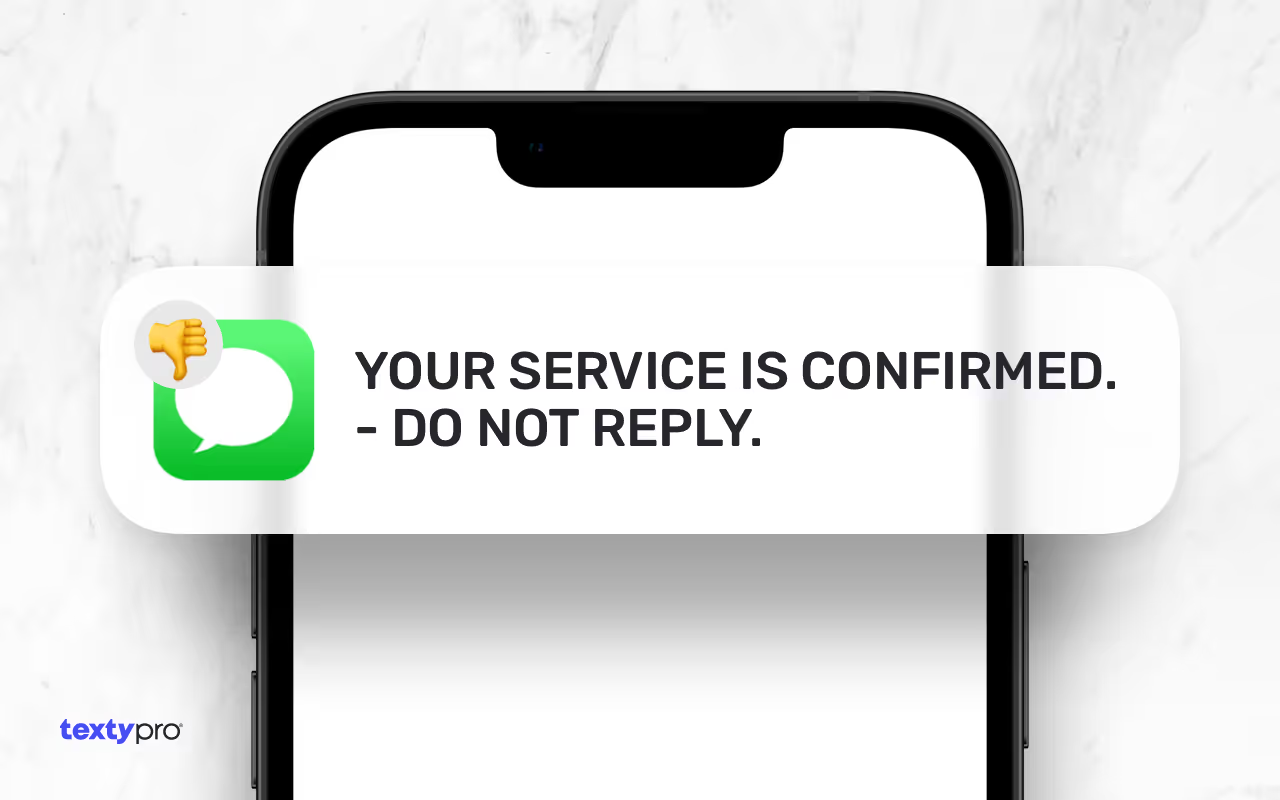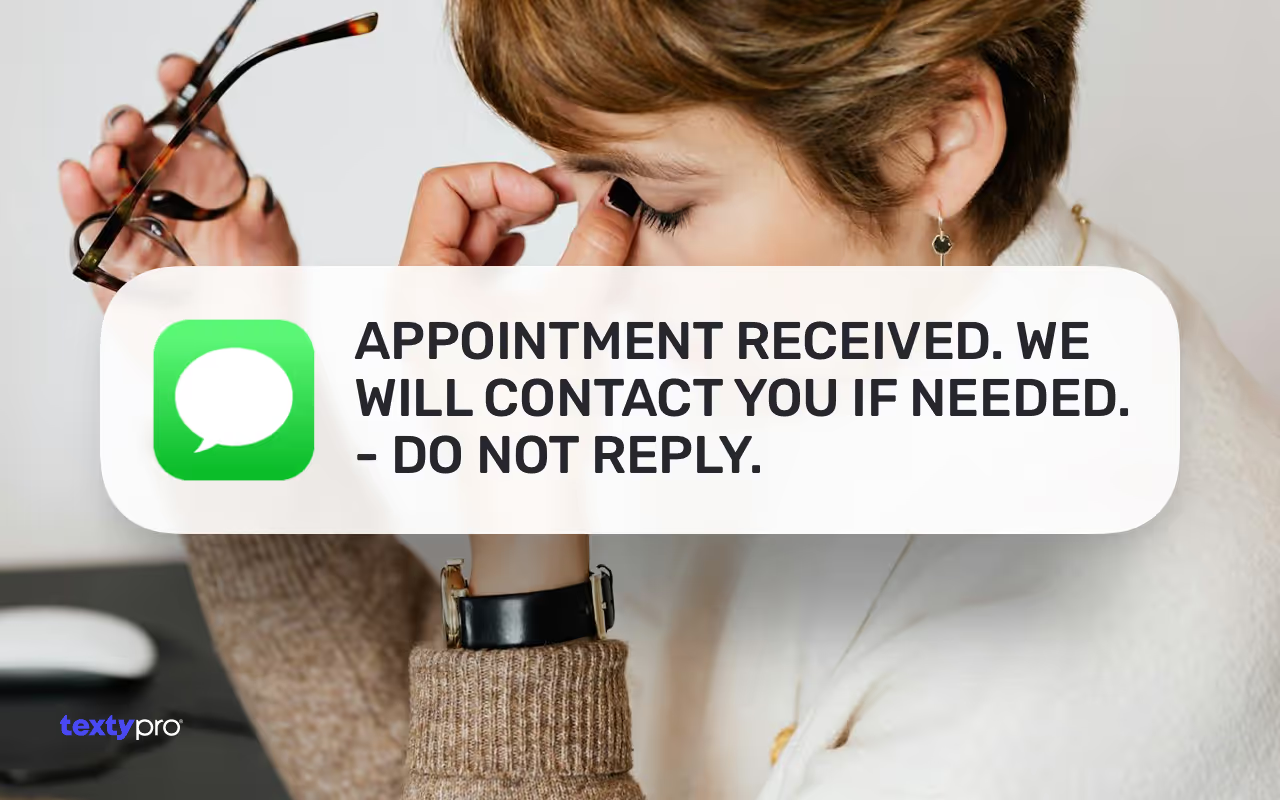If you’ve ever wondered why a customer stopped replying to your texts, there's a chance they didn’t just get busy. They actually blocked your number. Harsh? Maybe. But business texting, just like any communication channel, comes with some unspoken rules. And when those rules are broken, people ghost you. Or worse, report you.
Luckily, these common texting mistakes are easy to avoid once you know what they are. Let’s break down the seven most frequent business texting blunders that can sabotage your customer relationships and what to do instead.

1. You Text Like a Robot 🤖
If your message reads like it was written by a toaster, don’t be surprised when it gets ignored. Customers want to feel like there’s a real human on the other side of the conversation.
Bad:
“YOUR SERVICE IS CONFIRMED. - DO NOT REPLY.”
Better:
“Hi Jamie, your appointment at Elmwood Dental is confirmed for Tuesday at 2 PM. Text us here if you have any questions!”
Pro tip: Use your customer’s name, add some warmth, and avoid all-caps like it’s 2004. You can make your message feel more personal by adding a custom signature at the end. This could be something simple like your name, your company, or even a friendly sign-off.
2. You’re Sending Novel-Length Texts
This isn’t an email. If your message has multiple paragraphs, bullet points, and a dramatic twist at the end, you’ve lost them by sentence two. Remember, texts are read on a phone. If it’s too long, they’ll stop reading.
Why it’s a problem:
- Texts are meant to be quick
- Long blocks of text overwhelm people
- It feels impersonal, even if your intentions are good
What to do instead:
Break it up. Keep it tight. Send one clear thought per message. Think of it like texting a friend. Concise but polite. You can also take a look at 10 proven SMS templates that drive conversion.
3. You’re Texting Too Much (Or Too Little)
Yes, there’s a sweet spot.
Too many texts and you’re a pest.
Too few texts and you’re easily forgotten.
For example, if you’re sending five “Hey, just checking in again!” messages in three days, you're probably on someone’s block list right now.
Ideal frequency depends on the context:
- Reminders? 1 or 2 max
- Promotions? Weekly or biweekly is plenty
- Follow-ups? One follow-up a few days after your last message is reasonable
If in doubt, less is more but silence isn't golden either.
Pro tip: Avoid using abbreviations meant for personal texts in business messaging. Your recipient may not understand them, and it can come across as unprofessional. Clarity is key when communicating with customers or clients. Stick to full words and phrases that leave no room for confusion. Need a quick refresher on which abbreviations are appropriate for casual vs. business texting? Take a look at our guide: Commonly Used Text Message Abbreviations for Business and Personal Use.
4. You're Being Too Salesy, Too Soon
We get it. You have a product or service to sell. But if your very first text to a new contact is a discount code and 14 exclamation points, it screams desperation.
Better approach:
Build trust first. Answer their question. Help them solve a problem. Then, once you’ve earned it, bring in the promo.
Think of it like dating. You wouldn’t propose in the first message.
5. You’re Ignoring Replies 😬
This one stings because it’s more common than you think.
Many businesses get the first part right: they send a nice, personalized text. But when the customer replies? Crickets.
Why this happens:
- Messages go to an email inbox no one checks
- Team members don’t get notified
- It wasn’t a two-way texting platform to begin with
The fix:
If you’re going to text customers, you have to be ready to respond. Even a quick “Thanks for the reply. We’ll get back to you shortly” is better than radio silence.
Unanswered texts are one of the top reasons people block businesses. Make sure to respond to your customers' texts.
6. You Forgot the Opt-In (and the Law)
Texting isn’t the Wild West. You need permission before text messaging someone, especially for marketing.
Mistake:
Sending mass messages without explicit opt-in.
Why it matters:
- It’s illegal in the US and Canada (hi, TCPA and CASL)
- It erodes trust
- It guarantees high opt-out rates or worse, spam reports
Best practice:
- Get clear, written consent (learn how to get consent to send text messages)
- Let people know what they’re signing up for
- Make opting out easy (and honor it quickly)
Not only is this a legal requirement, it’s just good business.
7. You Never Add Value
This is the texting equivalent of talking just to hear yourself talk. If every message you send doesn’t inform, help, or delight, people will tune out.
Avoid messages like:
“Hey! We’re still here!”
Try messages like:
“We’ve added Saturday appointments for busy parents. Want to grab one?”
“Did you know your last oil change was 6 months ago? You’re due for smooth driving again.”
Customers don’t block value. They block noise.
Pro Tips for Better Business Texting
Want to make sure your texts actually get read and replied to? Keep these quick tips in your back pocket:
Keep it human
Write like you're texting a real person because you are. Skip the corporate lingo and canned phrases that feel impersonal. Learn how to create perfect text messages here.
Use first names
A simple “Hi Melissa” goes a long way in making the message feel personal and intentional.
Share helpful messages
Send important texts like appointment reminders to keep your customers informed and on time. It saves them the hassle and helps you avoid missed appointments and lost revenue.
Time it right
To keep customers happy and your messages compliant, avoid texting too early in the morning or too late at night. Stick to standard business hours whenever possible. Under TCPA regulations, it’s a violation to call or text recipients before 8:00 AM or after 9:00 PM in their local time zone.
Respond fast
If a customer texts you, don’t let it sit. 78% of consumers expect a reply within 10 minutes especially if it’s about an appointment or service request.
Let them reply
Don’t use “no-reply” numbers. Two-way texting leads to actual conversations, and actual conversations lead to sales, bookings, and loyalty.
Text from your business number
Messages from unknown mobile numbers are often blocked or flagged as spam. To ensure reliable delivery, use your official business number instead. Platforms like Texty Pro support texting from landlines and VoIP numbers, so you can stay connected using the number your customers already know.
The Bottom Line
Texting is still one of the most powerful tools for communicating with your customers but only when it’s done right. Avoid these seven common mistakes, and you’ll see higher response rates, better customer experiences, and far fewer people smashing the “block” button.
And if you're ready to text smarter, not harder, make sure your business texting platform is built to support real conversations, not just send bulk messages into the void.
→ Ready to level up your texting game? Try Texty Pro and start meaningful customer conversations today.





